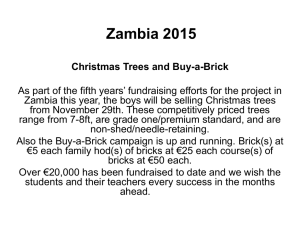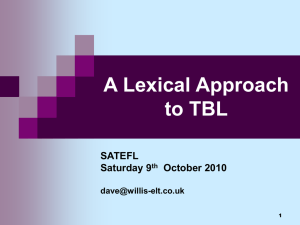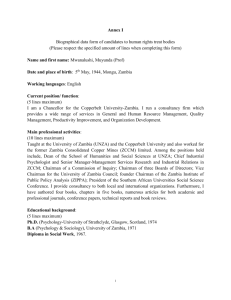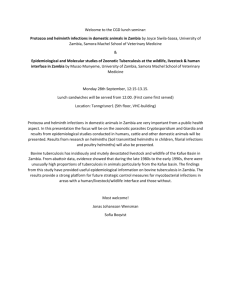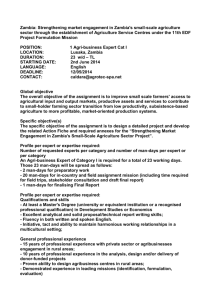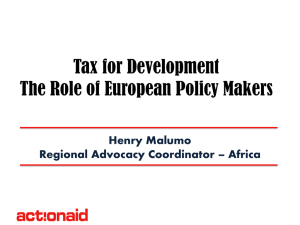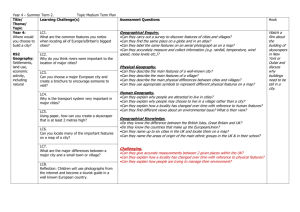World gifts Water and Education in Zambia case studies
advertisement
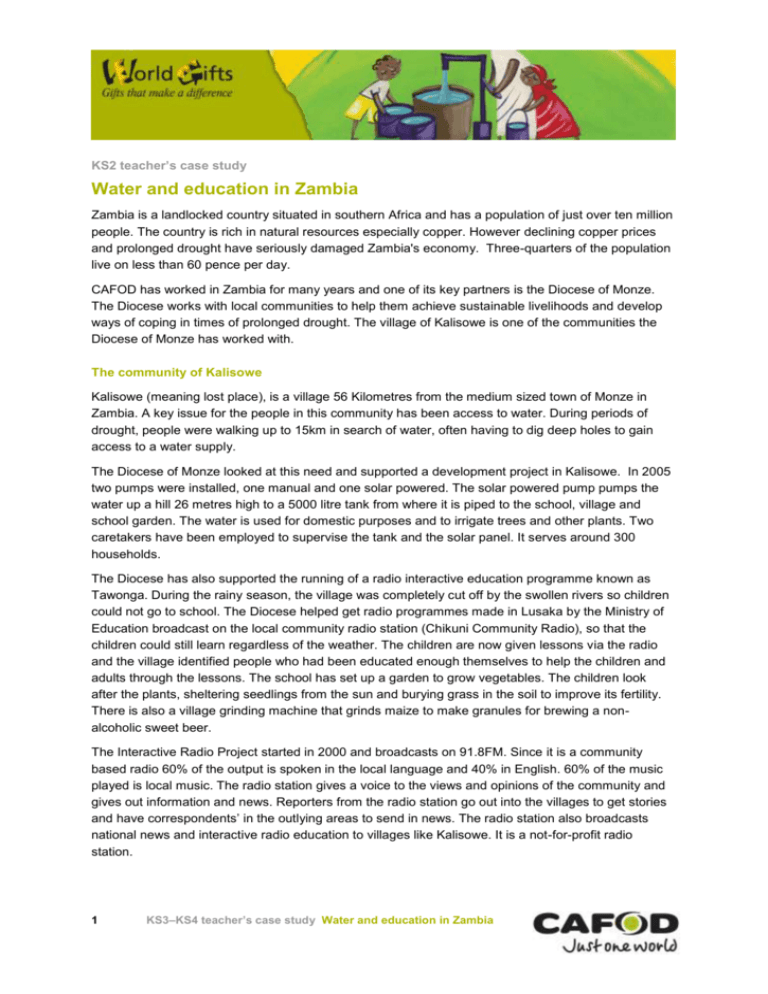
KS2 teacher’s case study Water and education in Zambia Zambia is a landlocked country situated in southern Africa and has a population of just over ten million people. The country is rich in natural resources especially copper. However declining copper prices and prolonged drought have seriously damaged Zambia's economy. Three-quarters of the population live on less than 60 pence per day. CAFOD has worked in Zambia for many years and one of its key partners is the Diocese of Monze. The Diocese works with local communities to help them achieve sustainable livelihoods and develop ways of coping in times of prolonged drought. The village of Kalisowe is one of the communities the Diocese of Monze has worked with. The community of Kalisowe Kalisowe (meaning lost place), is a village 56 Kilometres from the medium sized town of Monze in Zambia. A key issue for the people in this community has been access to water. During periods of drought, people were walking up to 15km in search of water, often having to dig deep holes to gain access to a water supply. The Diocese of Monze looked at this need and supported a development project in Kalisowe. In 2005 two pumps were installed, one manual and one solar powered. The solar powered pump pumps the water up a hill 26 metres high to a 5000 litre tank from where it is piped to the school, village and school garden. The water is used for domestic purposes and to irrigate trees and other plants. Two caretakers have been employed to supervise the tank and the solar panel. It serves around 300 households. The Diocese has also supported the running of a radio interactive education programme known as Tawonga. During the rainy season, the village was completely cut off by the swollen rivers so children could not go to school. The Diocese helped get radio programmes made in Lusaka by the Ministry of Education broadcast on the local community radio station (Chikuni Community Radio), so that the children could still learn regardless of the weather. The children are now given lessons via the radio and the village identified people who had been educated enough themselves to help the children and adults through the lessons. The school has set up a garden to grow vegetables. The children look after the plants, sheltering seedlings from the sun and burying grass in the soil to improve its fertility. There is also a village grinding machine that grinds maize to make granules for brewing a nonalcoholic sweet beer. The Interactive Radio Project started in 2000 and broadcasts on 91.8FM. Since it is a community based radio 60% of the output is spoken in the local language and 40% in English. 60% of the music played is local music. The radio station gives a voice to the views and opinions of the community and gives out information and news. Reporters from the radio station go out into the villages to get stories and have correspondents’ in the outlying areas to send in news. The radio station also broadcasts national news and interactive radio education to villages like Kalisowe. It is a not-for-profit radio station. 1 KS3–KS4 teacher’s case study Water and education in Zambia Many people don’t have enough money to send their children to school in Zambia. Only recently have the government abolished school fees in most parts of the country. There are no formal schools in some remote villages like Kalisowe. The place is surrounded by rivers, so it is very difficult for people to get to formal schools especially during the rainy season so the interactive radio education is a good option for them. Sometimes older people in the very remote communities also go to the radio school because they also want to learn how to read and write. As a country, Zambia has an aim to get all children into primary school by 2015 so this helps project is helping the country achieve that aim. There are 19 villages like Kailsowe which fall within Chikuni Parish, part if the Diocese of Monze. There are a few professional teachers in the area but otherwise, volunteers who have had at least some education help the pupils work through the radio lessons. The professional teachers go round to the villages and check how the radio schools are getting on. Anolaska Myambo Anolaska Myambo, (14) is from Kalisowe. She lives with her father Elisias and her mother Sylvia, and her brothers and sisters. “I’m studying in Grade 5. I like learning how to read and write. There are other people in the village who don’t know how to read and write so I can help them for example, if they get a letter delivered. Recently a letter was brought to me that was a message that this man’s father was sick. I could read it to him so he could go and visit his father. At home I help with the cooking and cleaning and gardening. When I grow up I want to be a teacher because I think it’s a really good job to give information to young people like me. I would like to stay here in Kalisowe when I grow up to teach the children here. We used to share dirty water with the animals but now we have clean water. I used to have to collect water from a very faraway place. It would take ages. Often we used to get to school late because of it. In my free time I like to play around with my friends, often we play netball. The school garden is really good; we grow tomatoes which we can sell. It is bringing development so we have to continue with it. Before the garden there was no source of income. We can use the money to buy clothes. Before there was a lot of hunger but now it’s much better because we have things to grow.” Elisias, Anolaska’s father “Seven of our children go to the radio interactive school. We want to build a proper school building and make this into a reasonable school. At the school progress is ok but I would like someone properly trained to teach working there. I want my children to be educated so that in future they can have better jobs in the future and help me to buy what I need. Before the pump was installed here we used to travel for four or more hours to get water. Now we don’t have to collect water. We have prepared gardens and cleared fields to grow crops; we never used to be able to do this because we didn’t have enough water. I feel very happy about the gardens. I have established a nursery of cabbage, tomatoes, rape and onions. We also grow cotton. I have ten hectares that I inherited from my father. I also saw timber to be made into furniture.” 2 KS3–KS4 teacher’s case study Water and education in Zambia Sylvia, Anolaska’s mother “The solar water pump has made our water supply so much better. We have been using it to make bricks for our community school. The water is abundant now. The solar power is very interesting. We didn’t know the sun could drive a water supply and make a tap work, it’s so great. We used to cover long distances to get water. There’s a stream here but during the dry season there’s nothing there. Before the water supply we had to go further and further down stream to find water. Now I have more time, I spend it gardening, growing vegetables for the family to eat. The school is good because it’s giving knowledge to our children. Before it started we all just stayed at home and didn’t go to school. I didn’t used to be able to write my own name now I can. I started going to school last year. The school is helpful because before I couldn’t read or write but now I’m able to communicate with my relatives by writing a letter. I’m very thankful for the development that’s come here I really hope more development can come because we have had a lot of problems in the past. It’s really made life easier round here.” Pancritias Myambo, (17) Anolaska’s brother “I’m in Grade Five in the community school. This school is ok and suitable for this place. In the other schools you have to pay school fees but here you just learn for free it’s great. I like maths, English and science. When I finish studying I hope I can go to a formal school and then I hope I can take a training opportunity somewhere. I would like to be a teacher because I admire teachers. I hope I can do that although I think I may be limited by my education standard. I think it’s important to complete your education so that when you’re older you can look after the elderly people. Now I help my parents in many ways, for example in maize production. At school we are learning how to plant bananas so I go home and transfer that knowledge to my parents’ home because they don’t know how to plant bananas. We’ve planted four trees at home which will make an improvement on what we have. When I’m free I herd the cattle and goats, take them for grazing and stop them grazing on our crops. Otherwise I study. I also play music with a local band called the Jabalando Brothers – it’s a good way of spending time. I hope we can be a big band in the future. I play the instrument called the babatone. I like the rainy season best because I like farming. I’m very appreciative of the pumps we have now. We hope the technology lasts so that we can do lots of farming here and in a few years if you come here you will find lots of crops, fruit and vegetables here. We need better roads with bridges to our village so that we can cross even if the rivers are flooded. At the moment we get cut off very easily. I go to the nearest town, Monze once a year. I like it there, there’s a good school and there isn’t so much dust as there is here. I hope we can get classrooms and teachers’ houses so we can learn properly like they do in that school in Monze.” 3 KS3–KS4 teacher’s case study Water and education in Zambia Odetta Myambo, (9) Anolaska’s sister “I’m in Grade Three. Today I learned numbers and how to say “Please can you help me” in English. I like learning how to read and write. It helps me because I can teach other people who can’t read and write. “Sometimes I study with my mum. At home I help my parents with the cooking, cleaning and collecting cotton from the fields. When I’m free I like reading and playing. I like skipping. It’s good having the water taps near my house – I used to have to travel a long way to get water so I’m really happy to have it nearby.” Making a difference How the John XXIII Institute has hepled communities in Nicaragua Education (in 2005) 2,573 children were supported in primary education in 2005 and also received free school meals. 567 children with learning difficulties received extra classes. 2,075 school packs were provided to primary children containing 5 notebooks, 6 pencils, 3 pens, 1 pack of coloured pencils, 1 pack of marker pens, 1 pack of crayons, 1 ruler, 1 pencil sharpener, 1 pair of scissors, 1 eraser, and other items. In 21 schools there were 2 bazaars where mothers could buy school items at low cost. 2,607 schoolchildren and 560 adults were vaccinated and checked for parasites. 12 new library-classrooms were set up in 12 primary schools, each containing 75 books of children’s stories. 222 people participated in the Programme of Basic Education for Adults. 248 educators attended workshops. Water and sanitation In 2005 the John XXIII Institute supported the construction of seven water systems for human consumption and sanitation, benefiting 1,417 people. In the municipalities of Villa El Carmen, Ciudad Dario and Tipitapa, drinking water was provided to homes of 167 families who took part in the house building project. In the communities of Cerro Pando and Las Lajas, two 250 foot deep wells were dug and two systems for drinking water were set up. In Cerro Pando, water is distributed from 12 public fountains and in Las Lajas from 14. 4 KS3–KS4 teacher’s case study Water and education in Zambia

